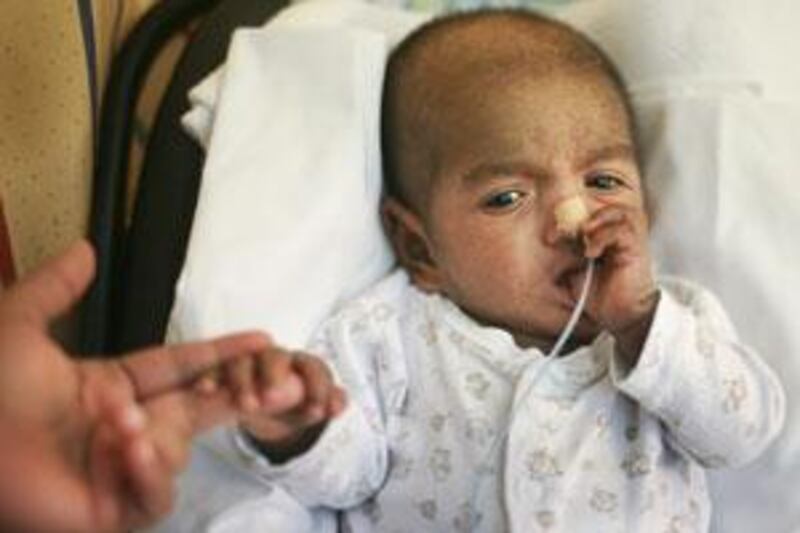ABU DHABI // As the father of nine-month-old Mohammad Yousaf waits to see if he is a donor match for his son, a leading transplant doctor said yesterday that it was time the UAE started performing bone marrow transplants. Dr Mustafa Kazim, a transplant nephrologist, said the UAE was fully equipped for the procedure and now needed to "get on and do it".
Mohammad suffers from a rare immunodeficiency disorder that can be cured by transplanting new bone marrow cells into his body. His father, Anzar Mohammad, is returning to Abu Dhabi this week from his job in Ruwais to hear whether he is a donor match. Because the procedure is not currently available in the UAE, patients have to travel abroad for treatment, often at great cost. Dr Kazim, who performed the country's first paediatric kidney transplant last year, said the UAE had the facilities and should take this opportunity to show it could do this type of transplant.
"I am ready to do this," he said. "If I get the go-ahead I will do it. I will also bring experts from the UK and Singapore, and we can do this successfully. "There is no reason at all why we cannot perform bone marrow transplants. The facilities are all there, we just need to get on and do it." The Ministry of Health announced in 2006 that it would set up a bone marrow transplant centre in Sharjah to treat patients with thalassaemia, leukaemia and other blood-related diseases.
No one from the ministry or Health Authority-Abu Dhabi was available yesterday to comment on the case. Dr Kazim said: "Bone marrow transplants are not any more challenging than liver or renal transplants that have been performed successfully in this country. "This child needs the transplant, and I can do it." Dr Kazim, who now works at the City Hospital in Dubai, said there had been a number of patients who had travelled abroad for bone marrow transplants when they could have been treated here.
The cost of a bone marrow transplant abroad can range from US$60,000 (Dh220,000) up to more than US$150,000, depending on where it is performed. If the UAE started performing them, the cost would be a small fraction of that, Dr Kazim said. "There are a number of Emiratis who need this service too," he said. "In this country they would not be as expensive for people living here, and we should look into future development of this essential service."
Dr Kazim said a bone marrow transplant for an immunodeficiency disorder was less complicated than one for other diseases such as leukaemia. Mohammad simply needs the cells to boost his immune system, whereas a leukaemia patient would need all of his bone marrow cells removed before the donor cells can be transplanted. "This case also shows how the whole region would benefit from a bone marrow registry where we could find suitable matches," he said.
"We have the facilities not only to facilitate future transplants in this country but to collaborate with other regions such as India." He said the UAE's unique demographic make-up put it in an ideal position to set up a registry for the future. Mr Mohammad is returning to Abu Dhabi on Wednesday to visit his son at Sheikh Khalifa Medical City and find out whether he is a donor match. His son as been in the hospital's care since birth.
Children with severe combined immunodeficiency disorders do not usually live longer than one year without a transplant. They are often referred to as "bubble babies" because they need to stay in a sterile bubble of clean air as they cannot fight off infection. With a successful bone marrow transplant, the child can grow new immune cells. The transplants usually take between six months and two years to complete.
Prognoses vary according to the patient's condition, but it is not uncommon for babies undergoing the treatment to lead normal, healthy lives into adulthood. @Email:munderwood@thenational.ae





